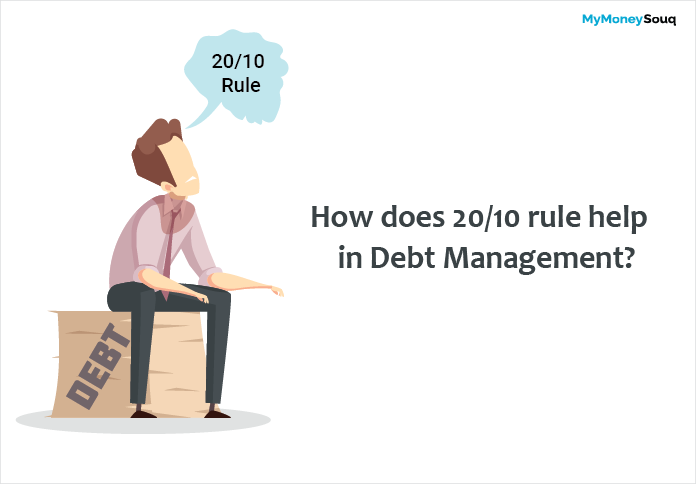The debt management system is an art, the 20/10 thumb rule limits payments of the consumer debts to not more than 20% of the total annual take-home income and it does not increase more than 10% of monthly income.
This rule can help in controlling the debt amount that an individual carries. It creates a rule as to how much yearly and monthly take-home payments should be for debt payments. By following the rule, an individual can know where there is excessive spending on debt payment and limit additional debts that were planned to take.
The rule of 20/10 has two parts which are discussed below:
20% of annual income– It describes the portion of yearly income that is allotted for the expense of debt. From the total amount of consumer debt, the borrowing should not exceed 20% of net annual income.
10% of monthly income– This part describes how much of monthly income should move towards repayment of debt. The total amount of consumer debts payments should be equal to not more than 10% of monthly net income.
These two easy calculations can make you sure that you are on the right track. You have to start with your monthly net income. The net salary amount is that which is deposited into your salary account every month. Calculate the monthly amount which is multiplied by 10%. This is the amount that you have to pay on your debts every month according to the 20/10 debt management system.
Suppose the take home salary of an employee is AED 5000 per month. Then the total consumer debts payments should not exceed AED 500.
The next thing that comes to evaluation is to look into the total annual debt payment system. Multiply your total monthly net income by 12 for annual net income and then multiply by 20%. The total of outstanding debt amount should not be more than that number.
For example- If an employee gets AED 5,000 per month or AED 60,000 per year then the total amount of debt should not be more than AED 12,000.
If your debt payments do not fall within the numbers you calculated then you are spending high towards repayment of debt. This reason will result in causing a financial burden.
How does it help you?
If you follow the 20/10 rule it will help you in two different ways. It becomes a guide during managing your finances, it gives you maximum returns for managing your debt. With these factors you can get your finances under your control.
You can set your financial goals by the 20/10 rule. It helps you set goals for doing calculations on how much debt you can carry. It provides you with a time frame for managing your money under your control.
It helps you in making calculations on debt repayments. You can set your goal of where your money should be invested, where you should change your financial habits and how you should limit your borrowings and finally how to repay your debts.
It helps in creating your financial structure and in understanding where your money is coming from and where it is being spent.
Drawbacks
There are some drawbacks to the rule like,
The 20/10 rule will not include mortgages or rent payments. The reason mortgage debt is considered as good debt is because as you pay the equity builds. The rule applies to consumer debts which includes payment to auto loan, credit card, student loan payments and other financial obligations.
The rule of 20/10 can be restrictive for student loan debt. Student loans can put you close to the threshold limit. By using the rule you cannot take additional debt until the loan is paid off.
The 20/10 rule will not give you information about how much you are making your earnings into savings. It gives you only information about how much debt amount you are having.
Takeaway
During the financial hardships you have to cut down your expenses and focus more on reducing interest debt. The 20/10 rule provides guidelines for managing your debt and reducing expenses. It provides you with guidelines where you are spending more money and how much you are liable to pay.
About the author
Vinay Kumar Goguru is a finance professional with more than 8 years of diverse experience as a researcher, instructor and Industry work experience with both public and private entities. Prior to MyMoneySouq, he spent 6 years in Berkadia, It's a commercial mortgage banking company. He has a "Doctoral Degree in Commerce" and two master's degrees with a specialization in Finance, one as Master of Commerce and other as Master of Business Administration. He has written several articles on personal finance, published by different International journals. He loves traveling, reading and writing is his passion. He has a dream of writing a book on his favorite finance topics.


